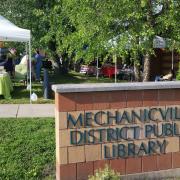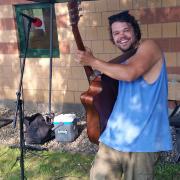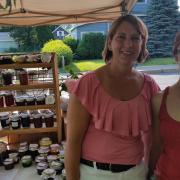Children
Tweens (10-12)
Adults
Intergenerational
Nourishing a Community: Mechanicville Farmers Market, Garden & Orchard
$101-250
In June 2017, the Mechanicville District Public Library kicked off a community farmers market on the library’s front lawn. Throughout the summer, on Mondays from 4 to 7 p.m., hundreds of people came to stock up on vegetables, pasta, eggs, honey and other goods from local farms.
For a community with a 16.3 percent poverty rate, a market delivering fresh, local goods at affordable prices was a game-changer, and it also gave local farms an opportunity to sell their products.
The success of the farmers market sparked another project: a series of raised garden beds on library grounds where library staff grows produce in a garden area and orchard. The produce is then donated to families in need via the local food bank. The next step: fruit trees, so anyone in the community can stop by the library to pick fresh fruit.
Advanced Planning
When patrons told us that transportation was an obstacle to getting fresh vegetables at a reasonable cost, we decided to launch a farmers market on the front lawn of the library.
I based this decision on community need after reading an article by the USDA demonstrating a connection between farmers markets and the health of the community they serve. By keeping produce local, we were helping local farms to reduce their carbon footprint.
We registered the library’s market with the USDA, ensuring that vendors at the market can accept WIC, food stamps, veteran’s coupons and senior coupons. By partnering with our county’s Office of the Aging, we were able to set up a booth to register seniors for the senior coupons. For customers to be able to use these coupons and WIC, we had to register our market with the New York State Office of Agriculture and Markets. (Which was well worth it; we later had a mother come from several towns away because no farmers markets in her area accepted WIC.)
Farmers and makers in the surrounding areas were invited to sell their goods at the market at no charge. This helps to keep prices low and ensures consistency at the market in slow times or inclement weather.
But what about those who couldn’t afford to buy produce at all? Recognizing that not everyone’s needs would be met at the farmers market, we worked with local police to create raised beds on library property to grow produce for those who couldn’t afford to purchase it, and to supplement the non-perishable groceries available at the food pantry.
Marketing
We marketed the market via our website, Facebook, The Express (local newspaper) and our electronic sign in front of the library. I also had lawn signs created and placed them at all entrances to the city; you could not enter or leave the city without seeing a sign about the farmers market! I also placed lawn signs in a local park where people walk in the warm months.
To solicit vendors, I went to other local farmers markets and collected business cards from the vendors there. I then called the vendors and offered them a spot at our market for free.
Budgeting
Budget — what budget?
We ended up spending $150 for the lawn signs. We are fortunate that the local newspaper owners love the library and are willing to publish for us for free.
In terms of staffing, I ended up working a lot of hours on market days, often from 8 a.m. to 8 p.m.
Day-of-event Activity
Set-up for the market begins at 2:30 or 3 p.m. depending on how much the vendors have to set up. All vendors are responsible for bringing their own tent and tables. Each vendor had to be set up and ready by 3:45 p.m. as the market opens at 4 p.m.
When weather does not cooperate, we move the market into the library, moving furniture and book stacks to make space.
In summer 2017, we hosted between 9 and 15 vendors at each market. Local farmers and makers offered vegetables, fruits, jams, desserts, honey, maple syrup, yogurt, seasonings, sauces, pasta, herbs, plants, meat and crafts. Each week also featured live entertainment.
Program Execution
Nearly 400 people turned out each week to shop, meet, talk and enjoy the entertainment. The library has tripled the number of library cards it has issued in the first year of the market, and we have increased circulation and attendance at programs. Our biggest problems are crowd management and finding space for the many vendors who would like to participate.
Several great partnerships emerged from this project. We collaborated with the local Lion’s Club, Mechanicville Police Department, Saratoga Sod, DiSiena Greenscapes and the Mechanicville Area Community Service Center Food Pantry. The local Lion’s Club donated $200 for the library to build raised beds to plant vegetables, which are harvested and donated to the Mechanicville Area Community Services Food Pantry. The Mechanicville Police Department agreed to build the beds for us; the library dropped off supplies to the station, and two hours later, the raised beds were delivered to the library.
Saratoga Sod donated free soil to fill the beds, and local nursery (and farmers market vendor) DiSiena Plantscapes was happy to donate tomatoes, peppers, onions, peas, beans, squash, leaf lettuce, broccoli and carrot plants for us to grow.
As of August 22, 2017, we had harvested five pounds of lettuce, four heads of broccoli, countless tomatoes, peas and beans, and four yellow squash, and onions, carrots and peppers were on the way.
Advice
I had a lot of fun and am looking forward to next year. That said, here are some things I have learned.
Make sure that the vendors are committed. Let them know that if they no-show for more than two weeks (without advance notice), then they lose their space.
Have a clear map of where each vendor will be located. You should have anchor vendors at each side of the market; this way, people have to walk through to get to the anchors, which helps the smaller vendors. Try to not put two vendors who sell the same items next to each other. And stand your ground; vendors may complain about someone having a better spot than them.
Stay away from independent sales (Avon, Arbonne, Jamberry, etc.).
Take the chance and bring in something that people have not experienced before, like reiki sessions.
Reach out to your own community — you may be surprised by how many people are willing to come help.
And always remember that if it doesn't work out, it's OK. But also remember that it is going to be awesome.
Supporting Materials
- Feedback (Coming Soon!)
- Programming Librarian Facebook Group





